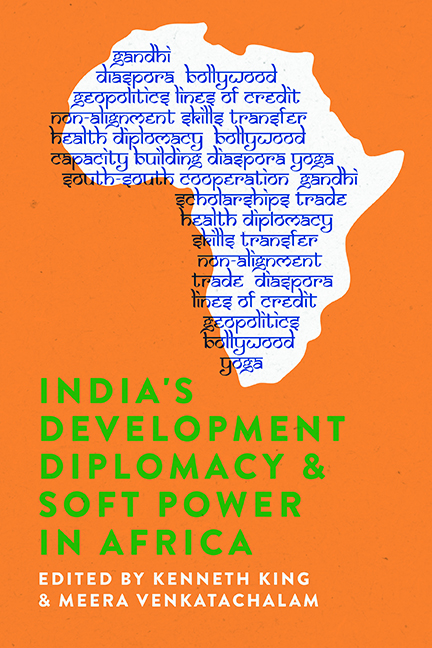Book contents
- Frontmatter
- Contents
- Notes on Contributors
- Acknowledgements
- List of Abbreviations
- Glossary
- Introduction: India–Africa Now: Changing Imaginaries and Knowledge Paradigms
- Part 1 The Geopolitical Imaginary and Soft Power
- Part 2 The Indian Political Right and the Reconfiguration of Soft Power in Africa
- Part 3 Capacity Building: Shifting Modalities and New Knowledgescapes
- Part 4 Skilling, Knowledge Transfer and Indo-African Interactions
- Conclusion: Reflections on India–Africa Studies, Development Cooperation and Soft Power
- Index
7 - Partnership in Times of Pandemic: India's Covid Diplomacy in Africa
Published online by Cambridge University Press: 26 May 2022
- Frontmatter
- Contents
- Notes on Contributors
- Acknowledgements
- List of Abbreviations
- Glossary
- Introduction: India–Africa Now: Changing Imaginaries and Knowledge Paradigms
- Part 1 The Geopolitical Imaginary and Soft Power
- Part 2 The Indian Political Right and the Reconfiguration of Soft Power in Africa
- Part 3 Capacity Building: Shifting Modalities and New Knowledgescapes
- Part 4 Skilling, Knowledge Transfer and Indo-African Interactions
- Conclusion: Reflections on India–Africa Studies, Development Cooperation and Soft Power
- Index
Summary
In 2020, India's ‘Covid diplomacy’ drew considerable attention and praise from foreign policy observers and analysts. This was hardly surprising, given its energy, velocity and ambition. This chapter builds on existing analyses and commentaries to advance our understanding of India's Covid diplomacy, focusing on its engagements in the African continent in particular, while also drawing attention to how its Covid diplomacy became so deeply mired in criticism and controversy almost one year after it first launched.
India's global health diplomacy
Although the concept of ‘global health diplomacy’ was institutionalised by the United Nations only in 2009, it has existed as a practice for much longer (Kickbusch 2013). Indian state and non-state actors have been involved in global health diplomacy since India's independence. For example, in 1963, the Indian community in Addis Ababa, with support from the Indian mission, set up the Gandhi Memorial Hospital for gynaecology and obstetrics to commemorate the twenty-fifth anniversary of the then Emperor Haile Selassie I (Embassy of the Federal Republic of Ethiopia n.d.).
In academic literatures, global public health diplomacy has variously been defined as a framework that encourages multilateral cooperation and investment in global health (Reid et al. 2019), an assemblage of negotiation processes involving multiple actors across multiple levels to manage the global policy environment (Kickbusch et al. 2007; Kickbusch and Behrendt 2017) and an educational tool that improves both global health and international relations (Adams et al. 2008; Katz et al. 2011). Common to these definitions is an understanding of the interdependent nature of public health and the need to develop transnational strategies to respond to public health risks.
An analytical review of the academic and grey literatures suggests that India's global health diplomacy has, to date, broadly taken place along four main axes: social, economic, political and humanitarian.
The social dimension of India's global health diplomacy has involved efforts to widen global access to medicines and vaccines and improve healthcare infrastructures in partner countries. This includes the provision of antiretroviral and antimalarial medicines to the Global Fund to Fight AIDS, TB and Malaria by Indian pharmaceutical companies such as Ranbaxy, Strides and Cipla (Horner 2020).
- Type
- Chapter
- Information
- India's Development Diplomacy and Soft Power in Africa , pp. 135 - 152Publisher: Boydell & BrewerPrint publication year: 2021

